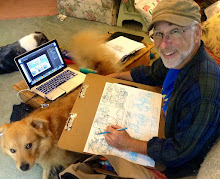Whew! I just finished Blake Bell's Strange and Stranger: The World of Steve Ditko--and not soon enough. Not for any fault of Blake Bell's-who has produced an attractive, detailed and insightful tome on Ditko's 50 -odd year professional career. Rather, I'm relieved to be free of Ditko's oppressive worldview, so thoroughly conveyed via Bell's comprehensive research and analysis.There are points-particularly late in the book-where I wanted to scream-- at Ditko's intransigence, obstinance, --his complicity in his own martyrdom.
The artist who emerges within this text is difficult, self-destructive and self-aggrandizing- with an apparent disdain for his audience, fans, and the early career creations for which he is justly revered. His sense of his own righteousness and the perceived failure of his readers, co-workers, collaborators--oh, just about anyone within striking distance-- to live up to his(and Ayn Rand's) moral code is suffocating, effectively ensuring the artist's isolation and long artistic decline-- and perhaps that's the point. Was there something in his make-up that made these circumstances an inevitability?
There is plenty of room for analysis of the personality within these pages, but alas, if Mr. Bell has entertained any ideas in this regard, the reader is not privy to them. Aside from the descriptions of Ditko's early life in Pennsylvania, there is scant biographical information presented here.While Bell has covered Diko's public and professional life in detail, charting creative differences, office interactions, editorial discussions and the like across every phase of the artist's career, the man outside of the office remains remote.
Has Ditko ever formed any romantic attachments? Has he been heartbroken? Cared for elderly parents? Does he have kids? What about relatives? Relations with his siblings, nieces, nephews? Does he like cats? dogs? Is there anyone who can speak well of the man? Has he ever been known for acts of kindness, of generosity--of any kind? What kind of deprivations has his isolation imposed on his life? What was it in his life that made him so susceptible to Rand's stark philosophy--and to super-heroes? Is there more to him than the bleak and unforgiving Rand-acolyte described in this book?
These are not questions asked out of prurient interest. They fulfill the basic requirements of biography-to help the reader understand the motivations and choices of an important artist. Even if Ditko's personal life has been uneventful---that observation would merit inclusion here.
That said--Bell has given us an interesting and detailed overview of the artist's professional life and his half-century career-all in a very attractive package. Bell reveals Ditko's early influences and examines Ditko's artistic development, pointing out both the highlights and the low points of Ditko's long career with a critical eye and leaving the reader with a good understanding of Ditko's continued importance and the reasons for his decline.
And Ditko's best work shines--those Warren pages alone are worth the price of admission--and examples from each phase of Ditko's career are represented here and given quality reproduction on big, big pages. Much of it is a joy to look at. Much of it is a reminder of lost potential. As one scans images of Shade or Stalker, Bell's descriptions of the many fruitless editorial discussions between Ditko and those who hoped to hire him late in his career become palpable; the frustrations real.
This is a book I will look at again and again, and refer to for insight into Ditko's work - that is for certain. But questions remain. Towards the end of the book Bell describes a striking scene in the artist's studio wherein Ditko stands over a cutting board apparently cutting up original artwork from the 1950's, valued in the thousands of dollars, rather than trust it to the vagaries of the open market or to exchange with a colleague.
Who does that? Who is this guy?
Monday, January 12, 2009
Subscribe to:
Post Comments (Atom)


No comments:
Post a Comment